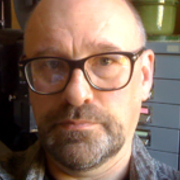
John Chrisstoffels
John Chrisstoffels has a long association with Christchurch music and film. His CV includes iconic music videos for record label Flying Nun, and many years teaching film at Canterbury University (plus the occasional class at Christchurch's NZ Broadcasting School).
Chrisstoffels first arrived in Christchurch in 1979 to start a religious studies degree, and play bass and cello in various bands (including The Terminals). Born in the Hawke's Bay town of Havelock North, he grew up in Mount Maunganui and Timaru.
Chrisstoffels’ arrival in Christchurch timed in nicely with the launch of local record label Flying Nun. Soon he was directing and filming music videos for Flying Nun bands like The Bats (Afternoon in Bed) and The Jean-Paul Sartre Experience (Inside and Out). When definitive Flying Nun documentary Heavenly Pop Hits was made, soon after the turn of the millennium, Chrisstoffels shot all the South Island interviews.
A portfolio of music videos helped win him a place to study film at Canterbury University's Ilam School of Fine Arts. He emerged with a Master of Fine Arts, and later (at Auckland University) a doctoral degree. In 2002 Chrisstoffels returned to Canterbury University to lecture in filmmaking.
Aside from music videos, Chrisstoffels has shot a wide range of projects. Many have been short films — including zombie tale Here Be Monsters, Gillian Ashurst's The Meek (2021), and his award-winning images for Gregory King's Junk (which marked a rare time Chrisstoffels shot outside the South Island).
In 1998 he wrote and directed Black Spot, an offbeat boy-meets-pirate tale. It was invited to festivals in Aotearoa and Melbourne. In the same period noted cinematographer Leon Narbey invited Chrisstoffels to shoot Visible Evidence, a documentary about photographers. In 2013 he made aeroplane short Aeroplace.
He has also been cinematographer on two low-budget features directed by frequent collaborator Patrick Gillies: crime romp Offensive Behaviour (2005, for which Chrisstoffels was nominated for an NZ Screen Award) and the “unashamedly uplifting” preacher tale The Holy Roller (2011), which captured the Christchurch skyline before the 2010 and 2011 earthquakes.
In late 2015 Chrisstoffels began shooting Human Traces in varied wild and woolly parts of Canterbury and Otago. Directed by Here Be Monsters' Nic Gorman, the psychological thriller is set on an isolated island, as a mysterious new arrival enters the lives of a husband and wife. NZ Herald reviewer George Fenwick praised the "stunning cinematography", which won Chrisstoffels a Gold Award from the NZ Cinematographers Society.
In 2023 Chrisstoffels directed Building Bridges: Bill Youren's Vision of Peace, a documentary about New Zealand farmer and peace activist Bill Youren. The story is told primarily through footage shot by Youren himself, capturing his travels in the 1950s to peace conferences in China to promote understanding between China and New Zealand.
Chrisstoffels first learnt about Youren through university colleagues James Beattie and Richard Bulle. They had written a book about Youren, and helped write the script. As of 2023, Chrisstoffels continues to teach filmmaking at Canterbury University.
Profile updated on 4 August 2023
Sources include
John Chrisstoffels
George Fenwick, 'New Zealand International Film Festival reviews: Human Traces, Beach Rats and more' - The NZ Herald, 6 August 2017
'John Chrisstoffels' University of Canterbury website. Accessed 4 August 2023